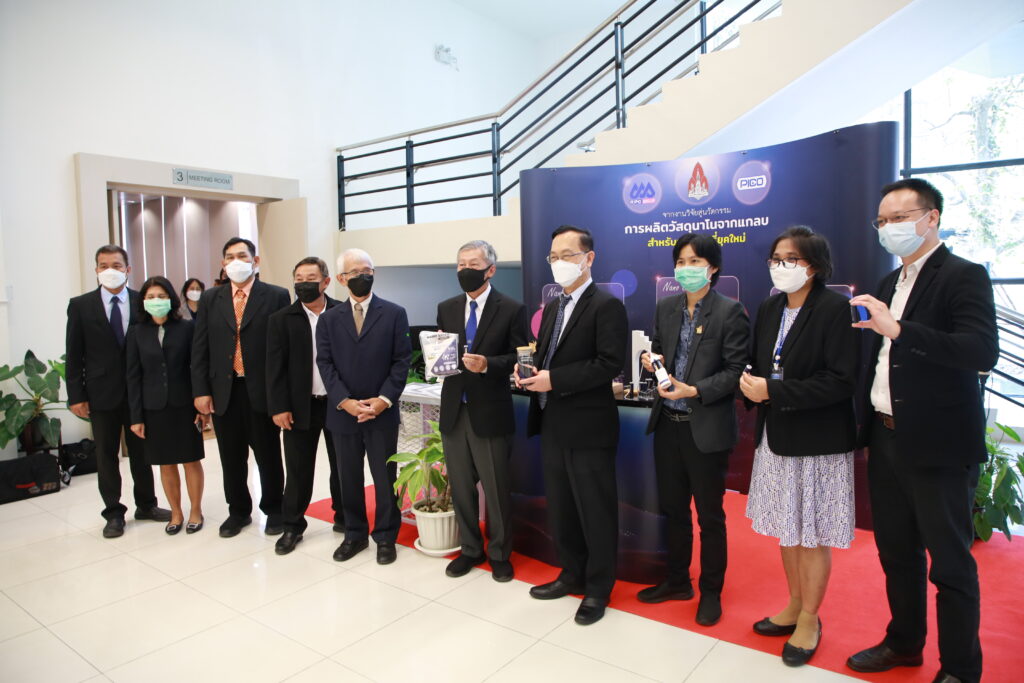
Assoc. Prof. Dr. Sophon Boonlue, Acting Associate Dean for Research and Innovation, Faculty of Science, KKU attended the press conference on “From research on the production of nanomaterials from rice husks to advance battery innovation” under the project of a prototype factory to produce materials for electrodes in cell-level lithium-ion batteries by Khon Kaen University, RPC Public Company Limited, Petro Instrument Company Limited at Meeting Room 3, Science Park Building, Khon Kaen University. On this occasion, Assoc. Prof. Dr. Chanchai Phanthongwiriyakul, The KKU president, delivered the welcome speech and opening remarks along with presenting the policy to support the development of research into the innovation of Khon Kaen University. Among the distinguished guests are Mr. Sajja Janethamnukul, Chairman of SPCG Public Company Limited, Mr. Akhathat Chuanphong, Managing Director of Petro-Instrument Co., Ltd., Mr. Kalaya Klaithong, General Manager of Business Development, Prof. Dr. Wittaya Amornkitbumrong, and Asst. Prof. Dr. Thanusit Burinprakhon, academic staff of the Department of Physics. Subsequently, Mr. Satja Janthamnukul discussed cooperation, support in the past, and opportunities for cooperation in the future. Assoc. Prof. Dr. Nongluck Meethong of the Physics Department, Faculty of Science, who is the project leader, presented the research project and delivered the results. “The prototype factory for producing materials for galvanizing batteries from rice husks carried out a test on the production of nano-silica materials from rice husks for use as anode electrodes in batteries, and Lithium-ion at the pilot-scale level as a raw material for battery production in commercial lithium-ion. It is a collaboration between 3 agencies that see opportunities to develop and extend research at the laboratory level to commercialization including Khon Kaen University, SPCG Public Company Limited, and S Instrument Company Limited, which Prime Minister General Prayut Chan-o-cha also visited the project on June 21, 2017”, said Assoc. Prof. Meethong.
Assoc. Prof. Dr. Nongluck Meethong, project leader with her research team has made tools and developed technology for the production of silica nanomaterials from rice husks for the extraction of silicon nanomaterials by using nano-silica material as raw material and has developed anode electrode material from suitable silicon nanomaterials for lithium-ion batteries with high electric capacity. In addition, it is safe and supports fast charging (Fast Charge).
For silica nanomaterials produced with purity above 99.95%, as small as 10-30 nm, it is not only raw material for nano-silicon production, but it also has potential for commercial applications in various fields such as a component of cosmetics, medical and dental materials, fertilizers and pesticides, forensic science or strengthening rubber products, and etc. It also has attributes according to industrial product standards (TIS 3860-2563)
For pre-manufactured silicon nanomaterials with a purity greater than 99.5%, small in size 50-100 nm, they are qualified according to the industrial standard (TIS 3087-2563) and suitable for use as raw materials and for making anode electrodes in lithium-ion batteries. It also has the potential to be used as a precursor in the semiconductor industry in electronic circuits and solar cells.
The main achievement of the project is the submission of 3 intellectual property rights related to the tools, production process, and nanomaterials from rice husks and delivering 4 prototypes of products that can be further commercialized, including silica nanomaterials; Nano Silicon material for making electrodes, and a prototype lithium-ion battery cell which the administrators of Khon Kaen University, SPCG Public Company Limited, and Petro- Instrument Company Limited will jointly find ways and opportunities to expand products and to commercialize intellectual property in the future.
 ไทย
ไทย